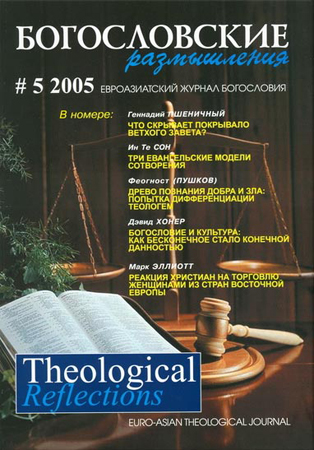The Tree of the Knowledge of Good and Evil: An Attempt to Differentiate Theologems
Keywords:
The Tree of the Knowledge of Good and Evil, tragedy of what Adam did, Church Fathers Gregory of Nazianzus, Maxim the Confessor, Gregory of Nyssa, and John Chrysostom,Abstract
In the modern world much interest is being shown to religion, its symbols, and its texts. Yet few understand the deep language of Scripture, its deep symbolic semantics. This lack of understanding often becomes the reason why people fall away from the Church (because a surface reading suggests that the Bible speaks in the language of “myth”), or leads to distortion of the realia described in the Bible. What is original sin? What is the tragedy of what Adam did, and why do his descendants suffer for his sin? All of these questions demand a phased explanation for modern people in contemporary, understandable language.This essay, “The Tree of the Knowledge of Good and Evil,” discusses one of the fundamental tenets of the Christian religion. It assists in understanding the essence of Adam’s fall. We present to the reader a detailed examination of the way four great Church Fathers—Gregory of Nazianzus, Maxim the Confessor, Gregory of Nyssa, and John Chrysostom—approached the question of interest to us. In the second part of the essay another question is examined: What did the fallen angel actually want of man in Paradise? This theological presentation represents an attempt on the part of the author to examine the question from a fresh, existential perspective
References
- Augustin. O knige Bytiia [On Genesis]. Tvoreniia, vol. 2. St. Petersburg: Aliteiia-YMCA Press, 2000.
- Bottero, Zhan. Povestvovanie o “pervorodnom grekhe” [The narrative of “original sin”]. Moscow, 1998.
- Brilliantov, A. I. Vliianie vostochnogo bogosloviia na zapadnoe v trudakh I. S. Erigeny [The influence of eastern theology on western in the works of S. Erigena]. Teologiia [CD]. SAIVDS, 2004.
- Gal’biati, E., A. P’iatstsa. Trudnye stranitsy Biblii (Vetkhii Zavet) [Difficult pages of the Bible (Old Testament)]. Milan-Moscow: Khristianskaia Rossiia, 1992.
- Ephraim the Syrian. Sobranie sochinenii v russkom perevode v 8 tomov [Collected works in Russian in 8 volumes]. Tolkovanie na kn. Bytiia [Commentary on the book of Genesis]. Volume 6.
- Feofan (Bystrov), Bishop of Poltava. “O voploshchenii Boga” [On the incarnation of God]. In Sbornik: Svt. Feofan Poltavskii, novyi zatvornik [Collected Works: St. Feofan Poltavskii, the new anchorite]. St. Petersburg, 1997.
- Glushchenko, Deacon Andrei. Znachenie antropologii prepodobnogo Maksima Ispovednika dlia sovremennoi pravoslavnoi apologetiki. Candidate dissertation, Kiev Spiritual Academy, Kiev, 2002.
- Gregory of Nyssa. Bol’shoe oglasitel’noe slovo [The great proclaimed word]. Kiev: Prolog, 2002.
- Gregory of Nazianzus. Slovo 45 [The word 45]. //http://www.portal-credo.ru/site/?act=lib&id=348.
- John Chrysostom. Besedy na kn. Bytiia [Discourses on the book of Genesis]. Tvoreniia, vol. 4. St. Petersburg: Aliteiia-YMCA Press, 2000.
- ____________. Vosem’ besed na Byttia [Eight discourses on Genesis]. Tvoreniia, vol. 4. St. Petersburg: Aliteiia-YMCA Press, 2000.
- Kessidi, F. Kh. Ot mifa k Logosu [From myth to Logos]. Moscow, 1972.
- Kern, Archimandrite Kiprian. Antropologiia svt. Grigoriia Palamy [Anthropology of St. Gregory Palamas]. Moscow, 1996.
- Larshe, Zh. K. Prepodobnyi Maksim Ispovednik—posrednik mezhdu Vostokom i Zapadom [Blessed Maksim Ispovednik—mediator between east and west]. Translated by O. Nikolaevaia. Moscow: Sretenskii monastyr’, 2004.
- Maxim the Confessor. Aporiia 35. Translated by I. Prolygina. Al’fa i Omega, No. 40: 2004.
- ____________. Aporiia 98. Translated by I. Prolygina. Al’fa i Omega, No. 38: 2003.
- ____________. Voprosy-otvety k Falassiiu [Questions and answers to Falassii]. Translated by A. Sidorov. Teologiia [CD]. SAIVDS, 2004.
- ____________. Sotnitsy o Liubvi [On love]. Translated by A. Sidorov. Teologiia [CD]. SAIVDS, 2004.
- ____________. Mistagogiia. Translated by A. Sidorov. Teologiia [CD]. SAIVDS, 2004.
- ____________. Aporiia 103, “Na slova: Prirody obnovliaiutsia i Bog stanovitsia chelovekom” [Natures are renewed and God becomes human]. Translated by A. Fokin. Teologiia [CD]. SAIVDS, 2004.
- ____________. Ambigvy k Ioannu, arkhiepiskopu Kipicheskomu [Ambiguas to John, archbishop of Kizicheskii]. Translated by Archimandrite Nektarii (Iashunskii, R. V.). www.romanitas.ru.
- ____________. Disput s Pirrom [Dispute with Pirro]. Translated by D. Pospelov. Moscow, 2004.
- Men’, Prot. Aleksandr. “Iskuplenie” [Redemption]. Put’, No. 6: 1994.
- Nikita Stifat. O rae [On paradise]. In Rai i chelovek: nasledie prepodobnogo Nikity Stifata [Paradise and man: The legacy of blessed Nikita Stifat]. Edited by Nikolai Kim. Translated by Nikolai Kim and Ol’ga Kim. St. Petersburg: Aliteiia, 2003.
Downloads
How to Cite
Issue
Section
License
Copyright (c) 2020 Hieromonk THEOGNOST (Pushkov)

This work is licensed under a Creative Commons Attribution-NonCommercial 4.0 International License.
All articles published in the Journal are distributed under a Creative Commons Attribution-NonCommercial 4.0 International License
By submitting an article for publication in Theological Reflections: Eastern European Journal of Theology the author grants the editors the right to publish the article and distribute it in electronic and print form.
The author reserves all copyrights and the right to use the materials of the article in whole or in part for educational purposes, to write his own dissertations, to prepare abstracts, conference reports, oral presentations, etc., as well as post electronic copies of articles (including the final electronic version downloaded from the journal’s official website) on non-commercial web-resources without the consent of the editorial board and founders.



